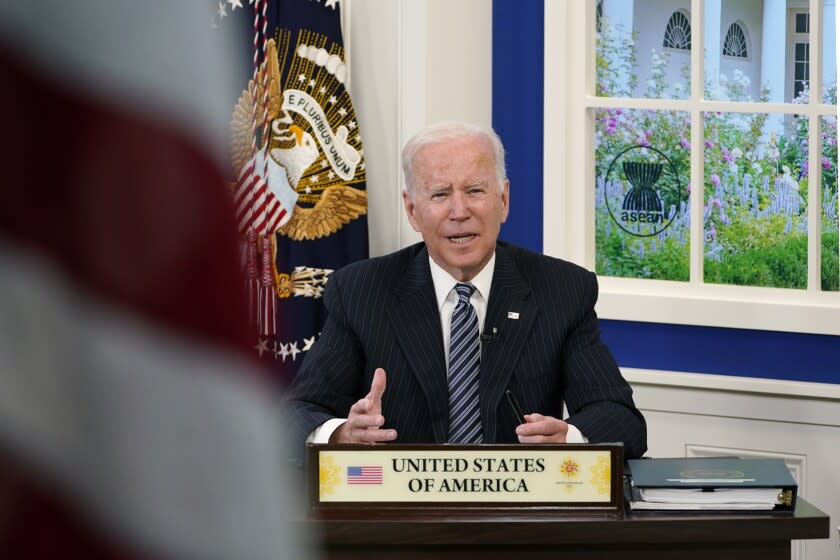Europe is the destination, but Asia is on Biden's mind

- Oops!Something went wrong.Please try again later.
President Biden is preparing for two international conferences in Europe this week, campaigning for Democrats and trying to reach an agenda-fulfilling deal on expanding safety net programs.
But he cleared a chunk of his schedule on Tuesday and Wednesday to participate in a virtual summit of Southeast Asian nations, a sign that the president remains keenly focused on foreign policy challenges posed by a rising China.
Like his predecessor, Donald Trump, Biden has expressed alarm about China's trade practices, its efforts to assert control over the South China Sea and its increasing aggressive behavior toward Taiwan.
However, Biden is devoting more time to building alliances, a shift from Trump, who skipped the same summit for three straight years.
"You can expect to see the United States deepening our longstanding cooperation," Biden said during the first of two meetings of the Assn. of Southeast Asian Nations, or ASEAN. He described the organization as "a linchpin for maintaining the resilience, the prosperity, and security of our shared region," and he suggested that he was planning a trip to Asia.
Experts said Biden's decision to simply show up for the summit is a show of progress.
"The bar is relatively low," said Ja-Ian Chong, an associate professor of political science at the National University of Singapore. "And part of the reason the bar is low is because there's still a hangover from the Trump years, where there was a lot of unpredictability and uncertainty."

ASEAN includes Brunei, Cambodia, Indonesia, Laos, Malaysia, Myanmar, the Philippines, Singapore, Thailand, and Vietnam. Although most of the countries are small, their total population is 650 million and their combined economy would rank as the fifth largest in the world.
Biden's participation in ASEAN came in the middle of a busy week. He's trying to seal the deal on legislation that would, among other things, increase funding for childcare and guarantee paid family leave for workers, and the White House is working with Democrats on ways to pay for expanded benefits.
He also campaigned on Tuesday for Terry McAuliffe, the Democratic candidate in the closely watched Virginia governor's race, and is preparing to fly to Europe on Thursday. He's attending the G-20 forum in Rome and a United Nations conference on climate change in Glasgow, Scotland.
However, Biden believes that closer ties in Asia will provide his administration strategic leverage in dealing with Beijing, making this week's ASEAN summit an important part of his approach to the region.
"The Biden administration's strategy is to contain China," said Eyck Freymann, a doctoral candidate in China studies at the University of Oxford. "They just don't use that word."
The president, he said, is hoping "to build an alphabet soup of overlapping coalitions," with the idea that "if you build enough of these coalitions, it's an impenetrable thicket."
Biden has already taken steps to strengthen such alliances. In September at the White House, he hosted the first in-person meeting with leaders of four major democracies with interests in Asia.
Though Biden and the leaders of Japan, India, and Australia — a group known as the Quad — did not mention China in a joint statement, it was clear Beijing was on their minds. Following their meetings, the leaders said they had recommitted "to our partnership, and to a region that is a bedrock of our shared security and prosperity — a free and open Indo-Pacific, which is also inclusive and resilient."
Less than two weeks before the Quad meeting, Biden announced a new security partnership with the United Kingdom and Australia, known as AUKUS. In addition to increased cooperation on issues like cybersecurity, the U.S. plans to work with Australia on a new fleet of nuclear-powered submarines, allowing its fleet to travel further and stealthier in a hotly contested region.

Joshua Kurlantzick, a senior fellow for Southeast Asia at the Council on Foreign Relations, suggested that there's an opening for the U.S. because China has turned off other countries by throwing its weight around.
"China is pursuing this aggressive, sort of in-your-face diplomacy," he said. "It's just totally unproductive and they've been undermining themselves."
Daniel Russel, a former State Department official who now works at the Asia Society Policy Institute, said American distribution of COVID-19 vaccines is one way to make headway in the region. Although China was faster to market its vaccines in Southeast Asia, there's skepticism about their effectiveness and growing interest in U.S.-developed versions.
"This is another example of where it's the American technology that looks best from the Southeast Asian point of view," Russel said.
This story originally appeared in Los Angeles Times.

